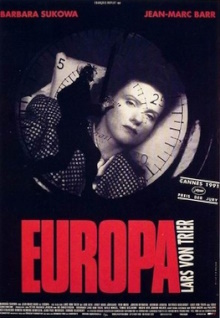The films of Lars von Trier have a mixed record for me though it’s true that at some point I need to go back to watch his best known ones. The fact that he’s such a unique auteur is undeniable however and I’d rate this one both as one of his strangest and yet most affecting to me. There’s so much that is experimental here, the imagery, the way it tries to hypnotize you, the shifts between black and white and color, and so on, and all of it serves a coherent purpose. Most of it, the core idea of it, exploring Germany in the immediate post-war period and all the pain and humiliation of being a citizen of a defeated and occupied country, is so refreshing and resonant.
A narrator introduces Leopold Kessler, an American of German descent, who arrives in Germany immediately after the Second World War. An uncle helps him get a job as a train conductor for the railway company Zentropa and walks him through the complex bureaucratic rules and procedures of the role. He sees firsthand the extent of the destruction in the country and how the entire populace looks defeated and hopeless. The Hartmann family who nominally owns Zentropa but under the strict supervision of the American occupiers, notices him and invites him to dinner at their house. The head of the family Max Hartmann is eager to use him to present a friendly image to foreigners while his daughter Katharina seems attracted to him. On a train journey, he is dismayed when he sees hanged corpses by the side of the railroad bearing the placard ‘Werwolf’. He is told that these are partisans still fighting against the American occupation. Even as he is drawn closer towards Katharina, he realizes that she has sympathies for the Werwolves and Max Hartmann is torn between cooperating with the Americans and the role his company played under Nazi rule.
The narrator’s voice talks in the second person, as if the viewer were Kessler himself. It treats the entire film as if were the surreal process of journeying into the otherworldly land of Europa. The voice hypnotizes the viewer and the images are all in black and white except in specific instances of heightened emotion. The codified bureaucracy and routines of the railway contribute to the surrealism as does the way of life of the Hartmann family who continue to live in their mansion that has been blasted full of holes. At the same time Kessler’s relationship with Katharina feels like something out of a cheap melodrama as she instantly falls for him and is the stereotypical femme fatale. Everyone seems to expect different things from Kessler and waits to see how he reacts. If nothing else, this is certainly a film with a unique artistic vision and there are quite a few shots that simply took my breath away, such as when Kessler walks into the church service.
Then there’s how this film wants to evince sympathy for the Germans who suffer under US occupation which I found to be a bold and novel perspective. This wouldn’t have worked if von Trier hadn’t been brutally fair. The Americans are thorough about dismantling Germany’s industrial capacity, and the Hartmanns speculate that they may also be motivated by wanting to improve their own competitiveness, and dispersing gatherings in the name of security. Yet it never does anything so crude as to depict the US soldiers as cruel goons. Instead they are simply depicted as fresh-faced young men doing their jobs as well as they can. Meanwhile Germany is a desolate wasteland full of emaciated people in barely more than rags and bereft of hope. But in fighting to regain Germany’s pride and honor, the Werwolves truly are ruthless, thinking nothing of harming innocents in order to strike back at the occupiers or assassinating Germans who cooperate with them. It’s an impossible moral quandary for Kessler who refused to fight in the war and arrived in Germany after it ended to offer what help he can. He even asks a priest whose side God is on. The priest replies that God is on both sides. Instead he condemns those who lack conviction and thus are on neither side.
I can’t say that I agree with the sentiment but it does show you step by step how it arrives at that position. Combined with the visual artistry and how the film itself purports to be an attempt at mass suggestion, this is a sophisticated piece of art that carefully plays with both form and genre in service of a highly original and controversial stance. There are times when I’ve been doubtful of von Trier’s abilities but this isn’t one of those times. It’s a brilliant and powerful statement.
